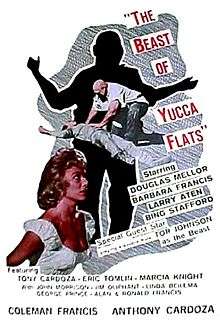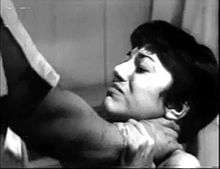The Beast of Yucca Flats
| The Beast of Yucca Flats | |
|---|---|
 A theatrical film poster for The Beast of Yucca Flats | |
| Directed by | Coleman Francis |
| Produced by |
Anthony Cardoza Coleman Francis Roland Morin Jim Oliphant Larry Aten Bing Stafford |
| Written by | Coleman Francis |
| Starring |
Tor Johnson Douglas Mellor Barbara Francis Bing Stafford Conrad Brooks |
| Narrated by | Coleman Francis |
| Music by |
Gene Kauer Irwin Nafshun Al Remington |
| Cinematography |
John Cagle Lee Strosnider |
| Edited by |
Coleman Francis Austin McKinney Lee Strosnider Anthony Cardoza |
| Distributed by | Cinema Associates |
Release dates |
|
Running time | 54 mins. |
| Country | United States |
| Language | English |
| Budget | $34,000 (est.)[1] |
The Beast of Yucca Flats is a B-movie horror film released in 1961. The film stars Swedish former wrestler Tor Johnson and was both written and directed by Coleman Francis. The plot concerns a Soviet scientist (Johnson), who defects and flees to a Nevada Test Site called Yucca Flats, only to be turned into a monster by radiation, who then menaces the desert. The film has very little dialogue and most of the speech is done by omniscient narration, provided by writer and director Francis.
Some critics have characterized the film as one of the worst science fiction horror films made, and one of the all-time worst films of any kind, even suggesting that it may be worse than Ed Wood's legendarily bad Plan 9 from Outer Space.[2] In 1995, the television comedy series Mystery Science Theater 3000 featured The Beast of Yucca Flats, helping the film develop a cult status.
Plot
A woman (Lanell Cado) steps out of a shower and is attacked and strangled to death by a mysterious man as the sound of a clock reverberates before going silent.
Later (or possibly before) in Yucca Flats, Nevada, Soviet scientist Joseph Javorsky (Tor Johnson) has defected from Russia and arrives in America with a briefcase carrying various military secrets, including the Soviet moon landing. Javorsky and his American contacts are suddenly attacked by a pair of KGB assassins (Anthony Cardoza and John Morrison) killing Javorsky's contacts and bodyguards. Javorsky flees into the desert, walking for a great distance, and the searing heat causing him to discard much of his clothing. When he wanders in range of an American nuclear test, the bewildered Russian is transformed by radiation into a mindless beast with an uncontrollable urge to kill. He proceeds to kill a couple in their car on a nearby road, prompting pursuit from two police officers Jim Archer (Bing Stafford) and Joe Dobson (Larry Aten).
Meanwhile, a vacationing family ventures along the same road. After stopping at a service station, the family's two young sons (Ronald and Alan Francis) wander off into the surrounding desert where they eventually encounter and escape from the mutated Javorsky. Their father (Douglas Mellor) searches for them, but is mistaken for the killer by one of the police officers, who is searching for the murderer from the air in a small plane. The officer opens fire with a high-powered rifle on the innocent man, who manages to escape.
Eventually the family is reunited and the police shoot and mortally wound Javorsky. A jackrabbit later nuzzles his dying body, and using the last of his strength he caresses it before dying.
Cast
- Bing Stafford as Jim Archer
- Larry Aten as Joe Dobson
- Tor Johnson as Joseph Javorsky/The Beast
- Douglas Mellor as Hank Radcliffe
- Barbara Francis as Lois Radcliffe
- Ronald Francis as Randy Radcliffe
- Alan Francis as Art Radcliffe
- Jim Oliphant as Vacationing Husband
- Linda Bielema as Vacationing Wife
- Anthony Cardoza as KGB Driver/Helpful Neighbor
- Bob Labansat as Javorsky's Bodyguard
- John Morrison as KGB Passenger
- Jim Miles as Javorsky's Driver
- Eric Tomlin as Motorist run off road
- George Prince as Man who reports murder
- Conrad Brooks as Man at airfield
- Graham Stafford as News Boy
- Lanell Cado as Strangled Woman
- Coleman Francis as Narrator/Gas Station Attendant/Newspaper Patron
- Marcia Knight as Jim's Woman
- Joseph Luis Rubin as Police Officer
Production
The setting for the film, "Yucca Flats," is based on the real-life Yucca Flat, which has been called "the most irradiated, nuclear-blasted spot on the face of the earth."[3] In 1970 – nine years after this film– 86 workers were exposed to radiation during the Yucca Flat Baneberry Test. In March 2009, TIME identified the accident as one of the world's worst nuclear disasters.[4] Actual shooting locations for the film were all in California: Santa Clarita (desert scenes), Saugus (airplane scenes) and Van Nuys (opening scene interior).[5]
The movie was filmed without a soundtrack. Narration, voiceovers and some sound effects were added in post-production. To avoid having to synchronize the audio to the picture, characters speak only when their faces are either off-screen or not clearly visible due to darkness or distance. Likewise, during scenes in which firearms are used, the muzzles of the guns are usually out of shot when the weapons are fired. Extensive narration is used in lieu of plot points being conveyed through dialogue.[6]
During scenes of gunplay, many characters appear at first to have suffered life-threatening bullet wounds, only to appear in later scenes fully recovered with no visible signs of having been wounded.
Opening murder scene

The first scene in the film is the strangling murder of a woman (Lanell Cado) who has just stepped out of a shower, by a man whose face is never shown; it is implied that the killer molests her corpse. The murderer is dressed like Javorsky after the blast, but the murder is never mentioned during the actual film, nor is there any apparent place in the narrative where it could be said to occur. (Javorsky had a burn on the back of his right hand, but the strangler does not.)
According to an interview by film historian Tom Weaver with the film's producer Anthony Cardoza, the scene was added after the film was complete because director Coleman Francis liked nude scenes. Some prints (such as the one used for the Mystery Science Theater 3000 episode and the print on YouTube) are edited to show the woman clothed for the duration of the scene (running 00:01:21), with the only nudity being a brief flash of breast as she towels herself in front of a mirror. The 2003 AlphaVideo DVD print has a slightly longer version of the scene (running 00:01:33), where the woman is shown naked as she puts on a pair of underwear, with both breasts visible several times before she is shown walking out of the room.[6][7][8]
Cado had a more substantial role in a later Coleman Francis film, Red Zone Cuba (1966), also released as Night Train to Mundo Fine.
Reception
The film was panned by critics at the time of its release and is considered one of the worst films of all time.[9] AllMovie panned the film, criticizing the film's "pretentious and obtuse narration" and further stating, "The most enjoyable aspect of this movie is its remarkably short running time".[10]
TV Guide awarded the film 1.5 / 4 stars.[11]
The film holds a 2.4 rating at the Internet Movie Database.[12]
See also
References
- ↑ Weaver, Tom. "The Fallout From Yucca Flats". bmonster.com. Retrieved 2008-04-27.
- ↑ Begg, Ken. "The Beast of Yucca Flats".
- ↑ Gerald H. Clarfield and William M. Wiecek (1984). Nuclear America: Military and Civilian Nuclear Power in the United States 1940–1980, Harper & Row, New York, p. 202.
- ↑ "The Worst Nuclear Disasters". Time.
- ↑ Weaver, Tom. "The Grand Tor: Anthony Cardoza recalls the Fallout from Yucca Flats". bmonster.com.
- 1 2 Weaver, Tom. "Anthony Cardoza's Tor of the Desert". bmonster.com.
- ↑ The Beast of Yucca Flats (DVD). AlphaVideo. 2003.
- ↑ "The Beast of Yucca Flats". Movie-Censorship.com.
- ↑ Maltin, Leonard. Leonard Maltin's Movie and Video Guide (2007 ed.). New York: Plume. p. 94. ISBN 0-452-28893-2.
- ↑ "The Beast of Yucca Flats (1961)". AllMovie. Retrieved 5 November 2014.
- ↑ "The Beast Of Yucca Flats Review". TV Guide. Retrieved 5 November 2014.
- ↑ "The Beast of Yucca Flats (1961)4". Internet Movie Database. Retrieved 5 November 2014.
External links
| Wikiquote has quotations related to: The Beast of Yucca Flats |
| Wikimedia Commons has media related to The Beast of Yucca Flats. |
- The Beast of Yucca Flats at the Internet Movie Database
- The Beast of Yucca Flats at AllMovie
- The Beast of Yucca Flats at Movie-Censorship.com